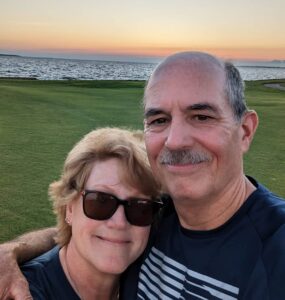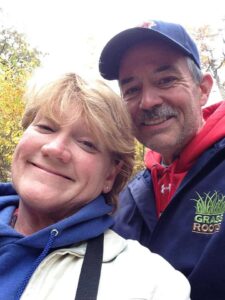
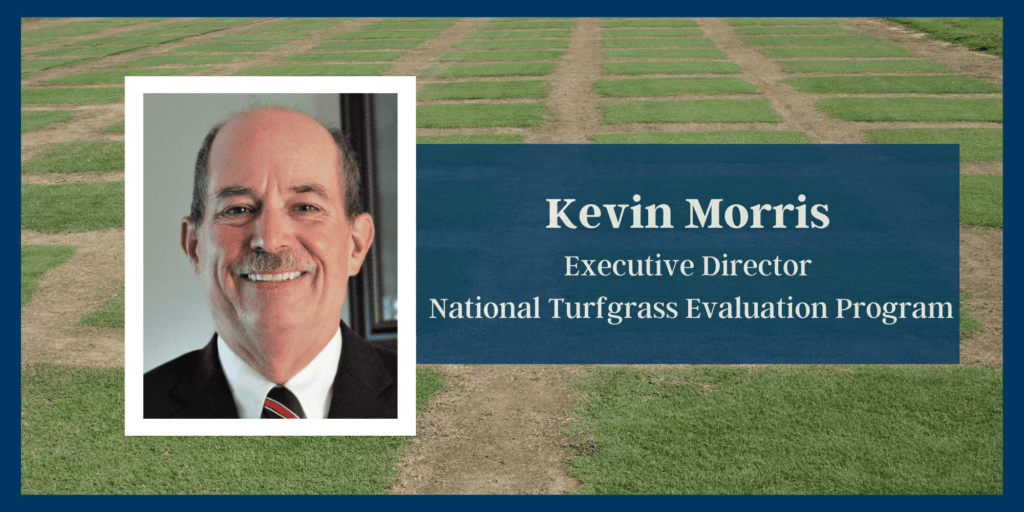
Meet Kevin Morris, the Leader Behind the National Turfgrass Evaluation Program
Kevin Morris, the seasoned Executive Director of the National Turfgrass Evaluation Program (NTEP), embarked on his impactful journey in the turfgrass industry back in the early ’80s. His remarkable career began with a pivotal decision to join the United States Department of Agriculture’s (USDA) Agriculture Research Service (ARS) facility in Beltsville, Maryland, in 1981. Remarkably, his job location was not far from his hometown and just a stone’s throw from the University of Maryland in College Park, where he pursued a degree in agricultural economics.
Morris found himself under the mentorship of the legendary turfgrass researcher, Jack Murray, a supportive figure from South Georgia whose belief in Morris provided the foundation for his journey. “He was very supportive and just had that Southern gentleman type of personality and he just really believed in me and gave me a chance. I really watched and emulated how he operated and then took over from there,” Morris said.
Morris’ inaugural project involved exploring the use of compost in turfgrass production at a time when Murray was the sole turfgrass specialist within the entire agency. Recognizing the significance of turfgrass research, Murray, along with a group of fellow scientists, laid the groundwork for the National Turfgrass Evaluation Program (NTEP), commencing the inaugural trials in 1980.
In 1982, as NTEP solidified its status as a promising endeavor, it embarked on a groundbreaking test of perennial ryegrasses, marking the program’s first venture into charging an entry fee for trials. It was during this transformative period that Murray extended a job offer to Morris, who eagerly accepted the opportunity to start his career.
From those early technical responsibilities of handling data and orchestrating trial logistics, Morris steadily ascended the ranks within NTEP. His unwavering dedication and commitment to the program’s mission eventually led him to the prestigious role of Executive Director, a position he has held since 1998.
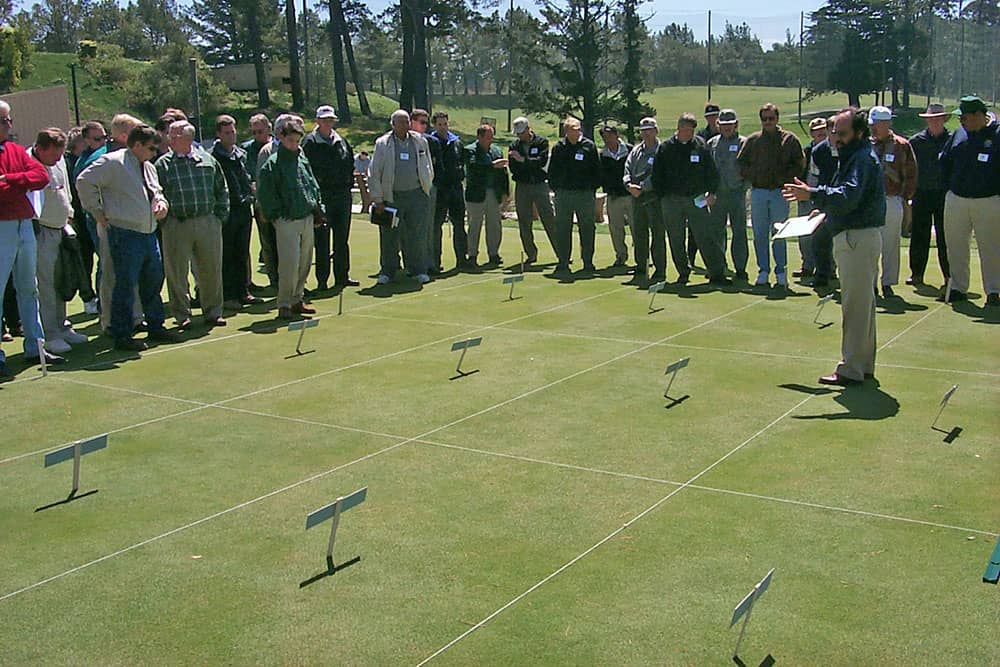
The first on-site golf course bentgrass NTEP/USGA trial at Crystal Springs Golf Club in Burlingame, CA. in 1998. Pictured (right) is Dr. Ali Harivandi from the University of California Cooperative Extension leading the discussion at the trial.
National Turfgrass Evaluation Program
NTEP, as Morris describes it, stands as an impartial nonprofit organization, uniting plant breeders, seed companies, sod companies, marketing entities and universities in collaborative research and product testing endeavors. Their vital role entails orchestrating trials, facilitating data collection and analysis and disseminating information freely to the public, without providing recommendations or analysis.
At the helm of NTEP, Morris is committed to ensuring consistency, accuracy and timely information release, all delivered at a reasonable cost, considering the expansive scope of data they offer. He oversees the program’s extensive network, managing over 250 agreements for trials spanning 35 states, with multiple locations in some. He and the The NTEP staff of Christine Knisley and Guangling Gao work together on contracts, accounting, data accuracy, statistical analysis and more. Morris credits his staff’s hard work and dedication to accuracy as key reasons for NTEP’s successes.
“The people in this industry are really great. They’re salt-of-the-earth type of people. They compete with each other but they don’t fight with each other very much,” Morris said.
He appreciates that instead, the turfgrass industry comes together to stand up and defend its products and existence to those who dislike it for water use, pesticide use and other reasons.
“We all recognize there are things we could do better as far as using less water, using fewer pesticides, less fertilizer and being more efficient. We try to provide data if the data is there so people can make advances in those areas and put those products on the market so the end-user can use less water, fertilizer and those things.”
Water conservation emerges as a pressing concern, prompting collaborations with organizations like the United States Golf Association (USGA) to explore water use trials on both cool and warm-season grasses. “Water is a big thing nationally. It’s a bigger issue out west but water is the thing that is taking grass out. It already is being replaced with dirt, other landscapes and God forbid, synthetic turf.”
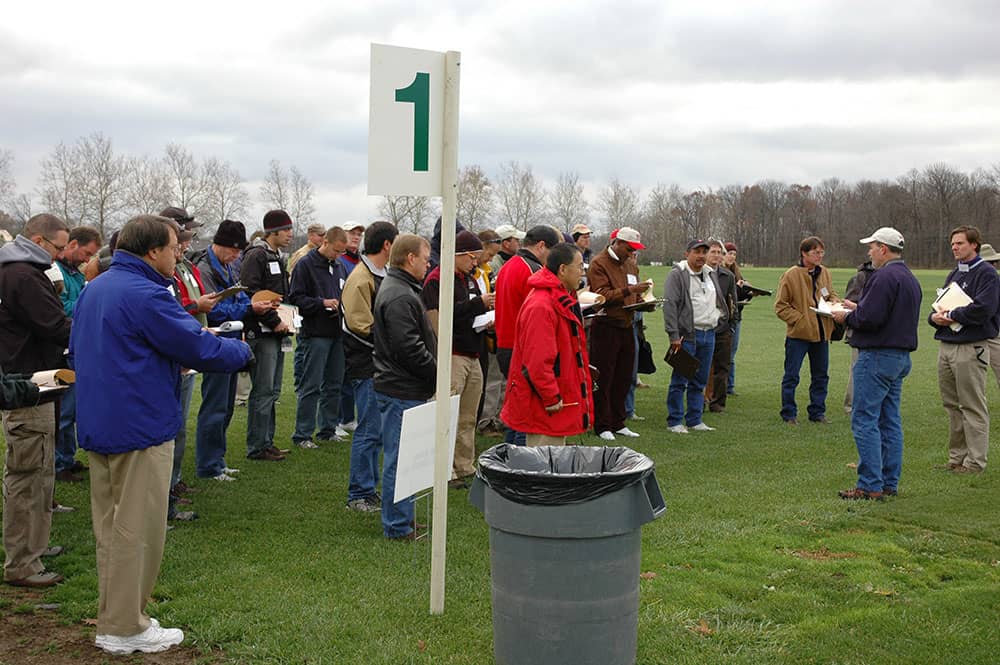
NTEP cooperator training at Purdue University in 2006.
NTEP Trials
NTEP trials run on five-year cycles for different turfgrass types like zoysias, centipede grass, tall fescue, and St. Augustinegrass, and for specific traits like the current low-input trial. NTEP organizes an Advisory Committee of Researchers for each trial to get input on what to test for, how to test, trial locations, etc. The committee then puts forth recommendations that set the trial parameters to the NTEP Policy Committee for review.
“We try to keep our ear to the ground, stay involved in groups in the industry to stay up to speed with some of the issues out there and find out what we can address,” Morris shared.
Members from Turfgrass Producers International, the Sports Field Managers Association, the Turfgrass Breeders Association, American Seed Trade Association, the US Golf Association, the Golf Course Superintendents Association of America and other industry associations work with NTEP and also serve on their governing boards.
“I think our governing board is pretty unique because we have representatives from turf seed groups, universities, various groups from golf, sports turf and sod production. We have a pretty diverse group that is very helpful. I don’t know that any other organization has that kind of broad diversity,” he shared.
Morris explained that while some grasses may not survive in certain climates, NTEP can still do ancillary trials to test for particular disease or insect issues, drought resistance, traffic tolerance and to gather winterkill data. He said it’s helpful from an advisory standpoint to have that kind of input and not limit testing to traditional areas only. Most NTEP trials take place on research facility sites so they can control as many variables as possible.
Over the past 35 years, Morris has seen a lot more grass varieties come into play for NTEP trials. He recalls the first tall fescue trial in 1983 had 30 entries and their current one has around 130 entries. He has also noticed a lot of warm-season grasses evolve from breeding programs at Oklahoma State University, Texas A&M University, the University of Florida, NC State and others over the past 15-20 years.
“There are a lot more folks involved in warm-season breeding. There’s a lot more competition obviously but also more products out there. It’s just grown exponentially. Also what’s grown is the need for specific information like drought tolerance and reduced pesticides where in the beginning it was just about making them darker green, with better characteristics.”
Achievements
Morris explained that NTEP has a responsibility to look at new products and trends as they come out. They tested some of the first perennial ryegrasses to show what regions they would grow and survive in, and which they would not. They also evaluated which ryegrasses are resistant to gray leaf spot, a disease that emerged in grasses in the mid-90s. More recently, they’ve been evaluating zoysiagrasses to see if they’re suitable for putting greens.
“We bring together diverse stakeholders, not just the plant breeders and the sponsor companies, but also the end users and the university folks. It gives us an opportunity to address a lot of different needs,” He explained. “Which is complicated because we can’t fully address all the questions that all these diverse groups have. We have to selectively address things.”
One example he shared was NorthBridge® Bermudagrass and Latitude 36® Bermudagrass, two grasses in the NTEP trials at the same time as they were released from Oklahoma State in 2011. Morris said they were neck-and-neck when it came to performance, but once they got out into the marketplace, superintendents and sport field managers gravitated one way or the other in picking favorites. “The end user will decide if it will make it in the marketplace or not. All we can do is do the best we can to provide something comprehensive and put the information out there to let the folks take it from there and try it,” Morris said.
National Turfgrass Federation
NTEP is a 501(c)(3) nonprofit research organization whose role is to provide information from a data perspective. In addition to his role as Executive Director at NTEP, Morris is also the President of another organization, the National Turfgrass Federation (NTF) which is a 501(c)(6) nonprofit. NTF can advocate and lobby at the federal level for research dollars and educate people on turfgrass-related issues and matters.
Running that voluntary, unpaid position, Morris is proud to share the turf industry has received around fifty million federal dollars for turfgrass research over the last 15-20 years. “We’ve now got a dozen scientists in the ARS working on turf. I remember we had one in the 1980s and now we have a dozen because of our advocacy. And we have research funding and SCRI (Specialty Crop Research Initiative) projects because we work to get USDA grants.” Morris looks forward to how NTEP and the National Turfgrass Federation will both continue working together in the future.
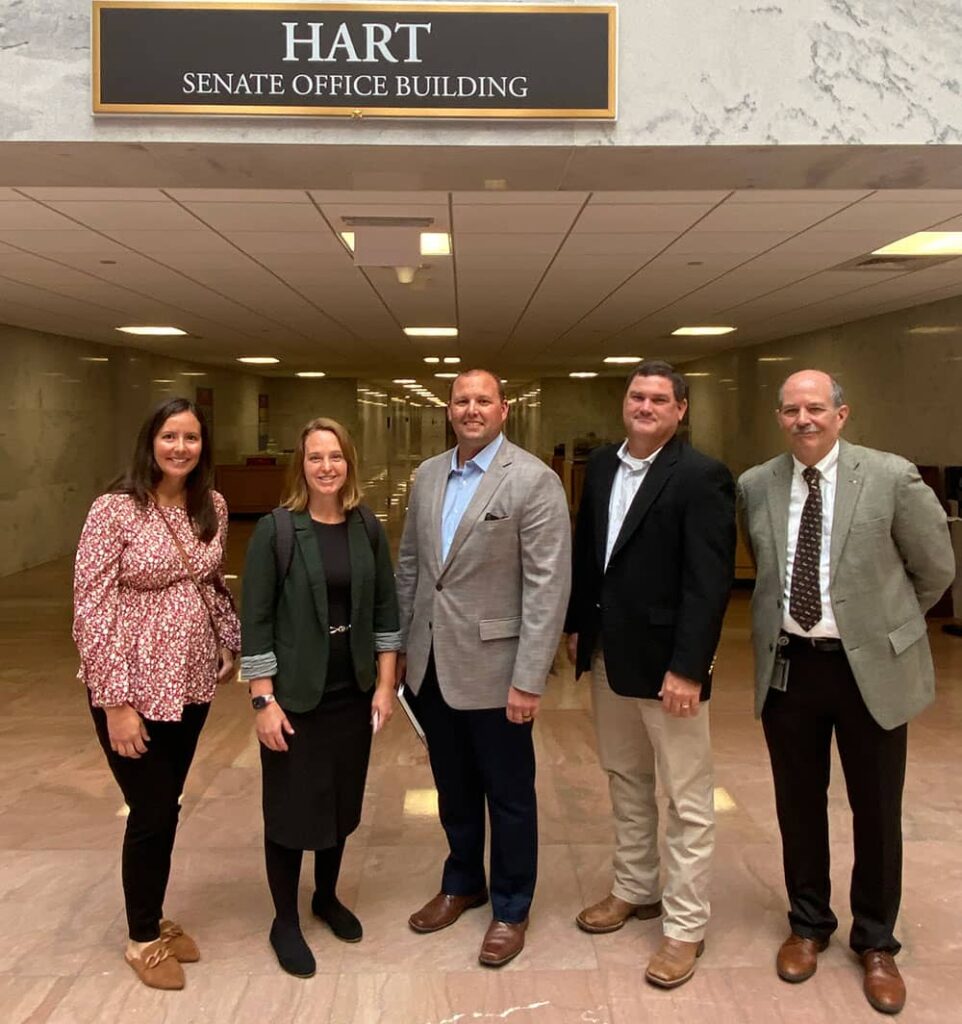
Kevin Morris (right) along with members of TPI lobbying at the Hart Senate Office Building in Washington, DC in Sept. 2023.
Future
Morris encourages aspiring professionals in the turfgrass industry who are starting out their careers in this field to seek out a really good mentor. He said it’s important to have someone they can trust, someone who’s willing to give them advice and someone they can watch and emulate. “That kind of training is the best training. I had someone who was honest and fair with people. I learned a lot of good values from my parents but watching Jack Murray and gaining advice from him and being ready to learn was important.”
Murray retired for health reasons in the late 80s and passed away in 1994. Morris really endeared Murray’s guidance in his career and attributes a lot of his success to what he learned from him.
He also complimented the support from NTEP’s governing board over the years. Morris explained he was always honest with them when they were doing well or not doing well. “Always being honest with people is the best policy as the old saying goes. I think people appreciate and get that you’re not perfect and make mistakes and will work with you.”
NTEP is in the midst of a significant data transition, from an old formatted system into a new Turfgrass Trial Explorer database. Their ultimate aim is for this database to become the primary source for accessing information, enhancing its overall functionality. Kevin Morris envisions a future where data collection becomes more efficient, with field data seamlessly and swiftly uploaded, in stark contrast to the current process that involves lengthy data analysis before website publication.
One of Morris’s top priorities before retirement is optimizing data usability, a goal he’s pursuing through collaboration with the University of Minnesota’s computer science department via an SCRI grant. Additionally, he’s laying the groundwork for the future inclusion of visual data representations from NTEP trials, moving beyond the traditional numerical columns. He looks forward to adapting and expanding the database to incorporate new agricultural technologies, phenotypic information and comprehensive testing of various characteristics.
Morris’s wife Kathleen is an educator, a school vice principal and his biggest supporter. Without his wife’s love and guidance, he would not have weathered the up and downs of a 40+ year career at NTEP. Married for 43 years, they have four children with four grandchildren and three more on the way. They enjoy spending time outdoors, hiking and playing sports together. Morris said he’s hopeful to retire by the end of 2025. “I’m not getting any younger so I’m ready to enjoy life with my wife, kids and grandkids.”
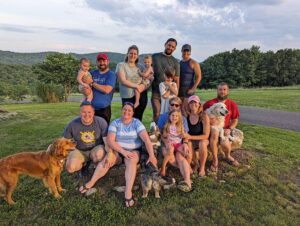
The Morris family.
They recently purchased his parent’s home and 70 acres of mountain property in Pennsylvania as a part of their retirement plan. They plan to split their time between the DC area and their new home.
“The Lord’s been good to us. I can’t complain at all, he’s blessed us,” Morris said. “I’m fortunate to have been in this job for so long. This is my 42nd year and most people don’t get lucky enough to have that kind of career. I’ve been really fortunate and it’s been great.”
This article was written by Cecilia Brown.

